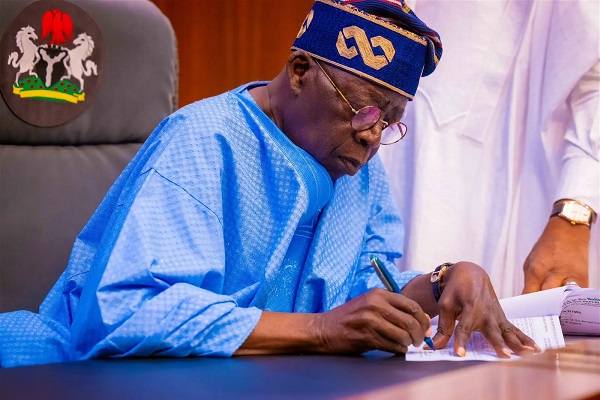President Bola Tinubu has formally requested the National Assembly’s approval for a fresh external borrowing plan of ₦1.767 trillion as part of the 2024 Appropriation Act.
The proposed loan is intended to partially finance the budget deficit of ₦9.7 trillion for the 2024 fiscal year.
The president’s letter was read during the plenary session on Tuesday, November 19, by the Speaker of the House of Representatives.
In the letter, Tinubu also presented the Medium-Term Expenditure Framework and Fiscal Strategy Paper (MTEF/FSP) for 2025–2027, alongside an amendment bill for the National Social Investment Programme (NSIP).
READ ALSO: Having Multiple Girlfriends With Constant Sex Won’t Prevent Prostate Cancer, Urologist Warns
The NSIP amendment aims to solidify the use of the national social register as the primary framework for implementing federal government welfare initiatives.
The borrowing plan comes amid growing concerns over Nigeria’s rising debt profile. Recent data from the Central Bank of Nigeria (CBN) revealed that the Federal Government spent $3.58 billion servicing foreign debt in the first nine months of 2024.
This represents a 39.77% increase from the $2.56 billion spent during the same period in 2023. The increasing debt servicing burden has raised questions about the country’s fiscal sustainability and reliance on external loans to bridge budgetary shortfalls.
The 2024 budget, approved at $26.7 trillion, includes a significant deficit of $9.7 trillion, which the government plans to offset through a mix of external and domestic borrowing.
READ ALSO: DisCo Begins Free Meter Distribution To Customers
If the loan is approved, it will add to Nigeria’s existing debt stock, further fueling debates over the nation’s borrowing strategy.
The National Assembly is expected to deliberate on the president’s requests in the coming days. Analysts predict intense scrutiny of the borrowing plan, given Nigeria’s increasing debt-service-to-revenue ratio and public concerns about fiscal management.
The outcomes of the discussions will significantly influence the government’s ability to implement its 2024 economic agenda and deliver on its social investment promises.
